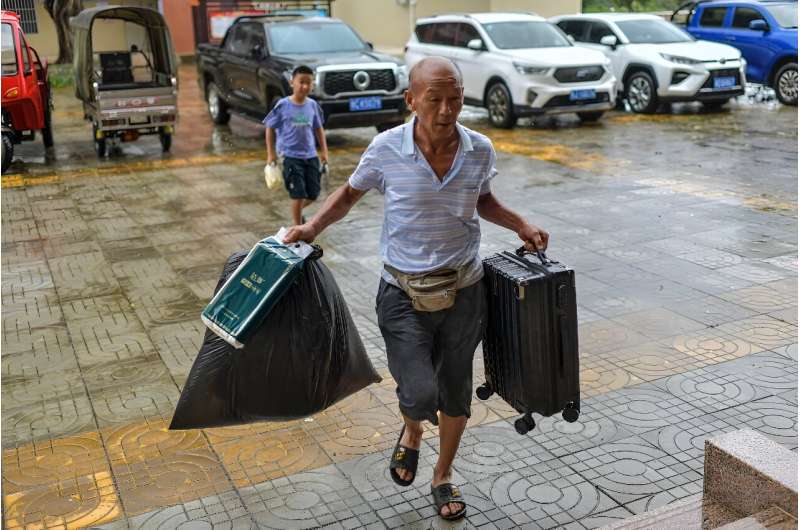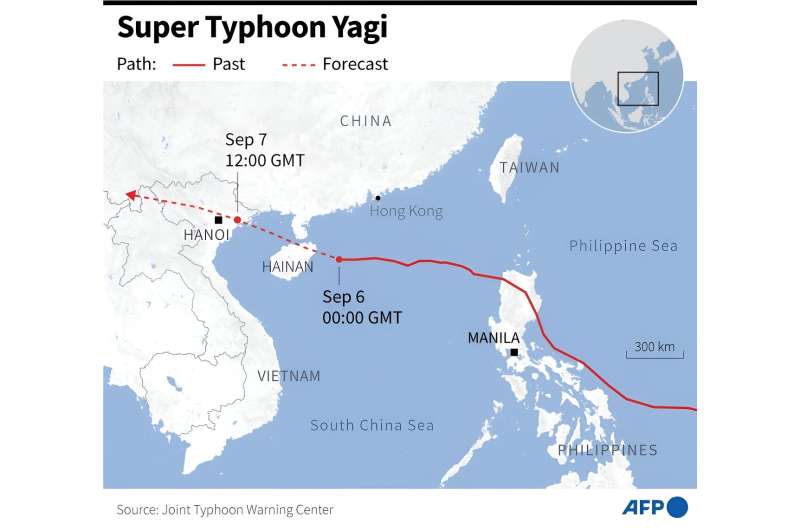This article has been reviewed according to Science X's editorial process and policies. Editors have highlighted the following attributes while ensuring the content's credibility:
fact-checked
reputable news agency
proofread
Super Typhoon Yagi slams into southern China, moves towards Vietnam

Super Typhoon Yagi slammed into southern China's Hainan island on Friday, bringing windspeeds of over 230 kilometers (143 miles) an hour in what is set to be the strongest storm to hit the region in more than a decade.
Hainan province evacuated more than 400,000 people ahead of the storm's expected landfall, while tens of thousands prepared to seek shelter in neighboring Vietnam.
Yagi killed at least 13 people in the Philippines this week when it was still classified as a tropical storm, triggering floods and landslides on the main island of Luzon before strengthening into a super typhoon over the past few days.
The storm made landfall in China on Friday along the coast of Hainan, a popular holiday destination, and neighboring Guangdong province at 4:20 pm local time (0820 GMT), the state-run Xinhua news agency said, citing authorities.
The typhoon "is equivalent to a Category 4 hurricane", according to NASA Earth Data.
In Hong Kong, a typhoon warning that had been in effect was lowered shortly after noon following heavy rains overnight as Yagi passed within 400 kilometers (250 miles) of the city.
Trading at Hong Kong's stock exchange was suspended on Friday and day schools were closed.
Authorities said five people were injured in the city due to the weather but damage was limited.
Southern China is frequently hit during summer and autumn by typhoons that form in the warm oceans east of the Philippines and then travel west.
However, climate change has made tropical storms more unpredictable and increased their intensity, leading to heavy rains and violent gusts that cause flash floods and coastal damage, experts say.

'I hope we will survive'
Yagi will head towards Vietnam after moving through southern China, on course to hit the northern and north-central regions around the famed UNESCO heritage site Halong Bay on Saturday.
According to Vietnam's defense ministry, more than 457,000 personnel from the army, police and other forces have been put on standby.
Authorities have announced plans to close four northern airports, including Hanoi's main international hub Noi Bai, for several hours on Saturday, while all coastal cities and provinces have put sailing bans in place from Friday.
Residents in the northern port of Hai Phong and the capital Hanoi have been stocking up on food and other necessities.
Tourist boats in Ha Long Bay have been brought ashore or taken into shelters.
Pham Quang Quyen, a resident of Quang Ninh province, told AFP from Tuan Chau island he had never experienced such a typhoon warning in nearly two decades.
"I hope we will survive the typhoon as we have been very well prepared. We are all very much used to dealing with storms and heavy rains here," Quyen said.
Authorities have sent messages to millions of users of Zalo, Vietnam's most popular online app, urging vigilance and readiness for the typhoon.
Public loudspeakers in Ha Long city have been encouraging residents to prepare for possible flooding.
© 2024 AFP





















